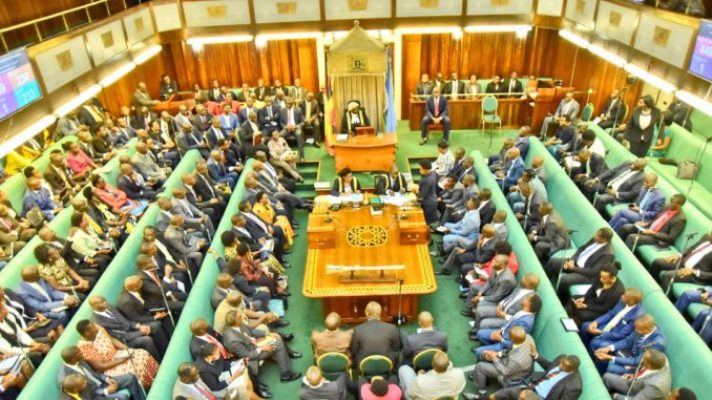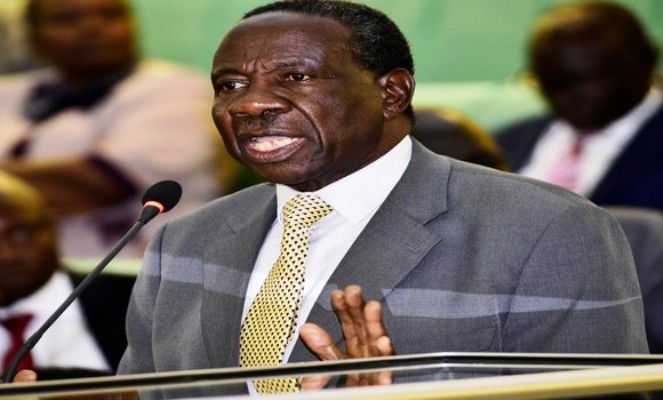Uganda’s President Yoweri Kaguta Museveni on Wednesday addressed the #TICAD7 conference plenary held under the theme, “Accelerating Economic Transformation and Improving Business Environment through Innovation and Private Sector engagement”.
In his address, Museveni advised foreign comapnies in the country to reports to their respective ambassadors cases that involve Ugandan officials soliciting bribes from them so that he can uproot the weevil.
Below is his full address
Your Excellencies,
Greetings from the people of the Republic of Uganda.
Regarding the theme: “Accelerating Economic Transformation and improving Business Environment through Innovation and Private Sector engagement”, the 3 crucial words are: “transformation”, “acceleration” and “private sector engagement”. The human beings have been here for the last 41/2 million years. During most of this time, man has been oppressed by two factors: oppression of man by nature and oppression of man by fellow men. Oppression of man by nature included disease, drought, floods, etc. Oppression of man by man is clear enough ─ the slave-trade, feudalism, colonialism, dictatorships, etc. Through understanding the laws of nature, man started taming nature and ameliorating his conditions. Since 1698 when the first steam engine was invented by Thomas Savery and the steam driven locomotive by George Stevenson in 1823, there has been alot of socio-economic transformation in different parts of the globe: Western Europe, North America, Japan, Korean and, more recently, in China and India.
Africa, for various reasons, has not fully joined this transformation and this is where there is the huge opportunity. The use of machines to do work, instead of relying on the muscles of man or beast, was the beginning of the first Industrial Revolution. Then the introduction of the railway and electricity lowering the costs of transport and production and supporting big volumes of output and conveyance constituted the second Industrial Revolution. Automation of machines ushered in the third Industrial Revolution. We are now dealing with the fourth Industrial Revolution in the form of Artificial Intelligence ─ Intelligent Machines. All these jumps and leaps in technology, increase the productive capacities of the innovating or adopting societies to their benefit, first and foremost, and, to some extent, the rest of humanity.
Nevertheless, enhanced production, as repeated events have shown, needs enhanced sustained consumption. When there is disequilibrium, as happened in the 1930s, you get a crisis e.g. the capitalist collapse of 1929. We have had repeated occurrences of this, ever-since.
Yet, this does not have to be so. This unevenness can be greatly diminished. When China and India were getting out of poverty, the whole World benefitted. The price of steel went from US$200 per tonne to US$900 per tonne, for instance. It is now around US$600 per tonne. So did the prices of copper, cement, etc.
Using those very clear examples, one can see how the impending socio-economic transformation of Africa, the origin of man, will impact the whole globe positively.
Africa has a land area of almost 12 million square miles. You can put the USA four times into Africa and it will fit there. The population of Africa is now 1.3 billion. It will be 2.5 billion by 2050 ─ in the next 30 years. The present depressed purchasing power of Africa is US$6,906 trillion. The present purchasing power of the USA is US$19.36trillion. If the Africans were consuming at the same level as the Americans, their purchasing power would be US$78.4trillion. The Africans would benefit and the World would benefit. Africans are not going to be only consumers; but they will be and they are beginning to be also producers, not just of raw-materials, but also producers of a huge spectrum of finished goods: textiles, ceramics, processed foods, leather, vehicles, machine tools, electrical appliances, etc. etc. This is if I go by the examples I see in Uganda. Africa has now resurrected the idea of the Continental Free Trade Area (CFTA) which was first born in Abuja in 1990.
Therefore, the transformation is spreading to Africa, inevitably. Moreover, transformation does not simply mean machines and technology. It also involves the transformation of the society ─ from the old traditional, pre-capitalist modes of only working for the stomach (subsistence) and the ancient artisanal skills (black-smith, potters, carpenters, etc.), to a literate and more commercially oriented society, through universal education among other channels.
This is where the other two words come in: “innovation” and “private sector engagement”. Africa, by 1900, had been totally conquered by the Western Imperialist countries of: Britain, France, Portugal and Spain. By 1955, starting with the Sudan, Africa, utilizing a number of factors, started regaining her independence. South Africa, in 1994, was the last country to regain her independence. Nevertheless, Africa, certainly Uganda, has maintained close cultural and economic ties with the West. Japan, after the 2nd World War, became an ally of the West. Yet, the Western and Japanese Private Sector have not helped Africa as much as they could have done. Nor even the Western governments. The Western governments, first of all, refused to help Africa, certainly Uganda, in the crucial areas of infrastructure (especially the railway and electricity). Yet, there would be talk of “private sector-led growth”. How can there be private-sector-led growth without electricity and rail transport?
Yes, after some pressure, the World Bank started supporting the construction of the tarmac roads. Roads, however, are not the least costly mode of transport. If you want Africa to develop, you must support the railways and electricity like our friends the Chinese have done. That is how the West developed. That is how Japan developed: the railways, electricity, etc.
Secondly, the Western and Japanese private sector has been reluctant to come to Uganda and, maybe, other African countries. Sometimes, they talk of “corruption” in Africa being the impediment.
This cannot be honest. What can be more corrupt than the slave-trade and the colonial forced labour (kasanvu)? In fact, one type of coffee in Uganda is known as kiboko (caning) because people were being beaten to grow it. I must salute the Chinese government for practically encouraging their private sector to come to Africa. I hear that their government has put money in the Exim Bank of China. Chinese companies are encouraged to come to Africa, identify “profitable” projects and come back and apply for the money. In Uganda, some Chinese companies have used this method to build a fertilizer factory and a steel one. Other Chinese companies are using their money to build many factories. Even some Indian factories are being built in that way.
Why can’t the Japanese companies and Western companies do the same? Uganda is not devoid of the entrepreneurial classes. Unlike in the colonial times, the transport sector (buses, taxis, boda-bodas, etc.) is now totally indigenized. The hospitality industry (hotels, etc.) is quite indigenized; the private secondary schools are more than the government ones ─ all by Ugandans. Real Estate is now Ugandanized.
Trading is now indigenized ─ especially the importing sector. Some aspects of the export business ─ e.g. grain, milk products, etc., etc. It is in manufacturing that the Ugandan private sector is not yet rich enough or knowledgeable enough to venture. This is where our partners from Japan and the West could have helped. The Chinese and, to some extent, the Indians, are helping. It is not too late.
I want to thank the Japanese government for the support they have given Uganda such as the magnificent Nile bridge, the Atiak-Bibia-Nimule road, Bujagali interconnection, Jinja-Nile bridge, Power line and substation between Kenya-Uganda-Rwanda, the Mityana hospital, Arua hospital, Gulu hospital, Makerere University Research, etc., etc. Other Western governments, such as the one of the USA, have supported social programmes in health, education, etc. I salute all of them. That is why we suggest that they should crown their contribution with encouraging their private sectors to help Africa expand her wealth by investing in value addition and the products of knowledge. In that way, Africa will be able to support the social programmes and deepen them by herself.
On the issue of corruption, I advised the foreign companies to report to their respective Ambassadors if any corrupt Ugandan official asks for bribes. The Ambassadors would, then, link up with me directly and we uproot the weevils (kawukumi). This is an easily solvable problem. It should not obstruct our joint efforts to maximize the prosperity of Africa and the World. Prime Minister Abe today spoke very well on the issue of the Japanese private sector going aggressively in Africa. They will be most welcome.
Finally, the issue of market access to the Japanese market ─ quota free, tax-free. It would be good for Japan (get cheaper goods) and for Africa (get a good market).
I thank you.Date: Wednesday, August 28, 2019





